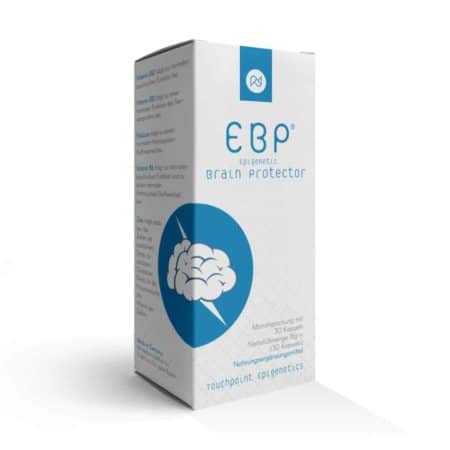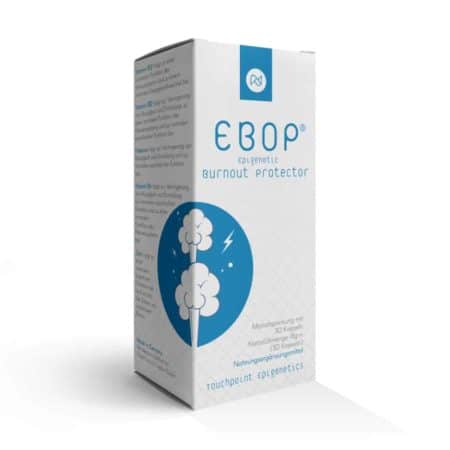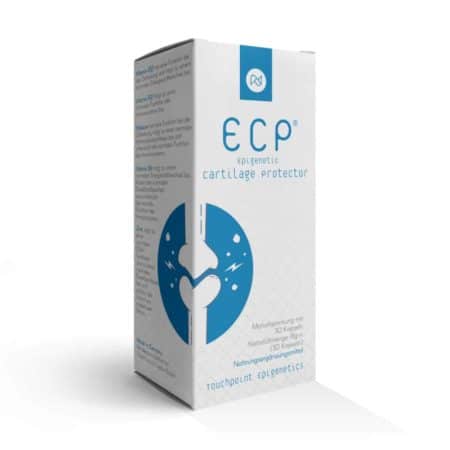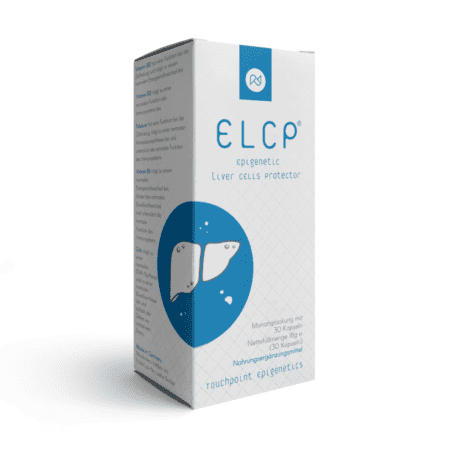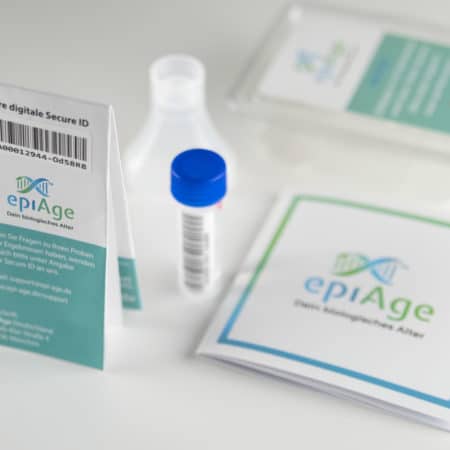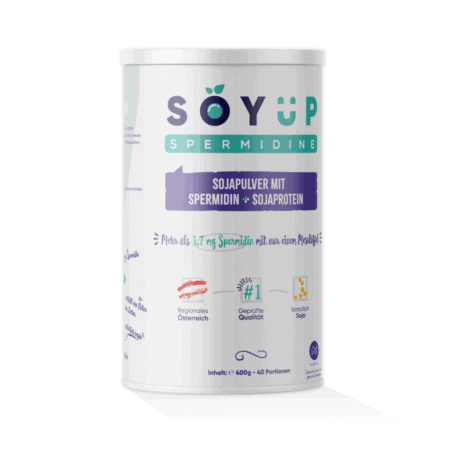BE HEALTHY and STAY HEALTHY is the ultimate ambition for all of us
A healthy cell is an essential requirement.
Unfortunately, diseases and aging are the rule.
Aging will be curable.
The latest scientific research suggests that using ademetionine as a supplement reduces age-related loss of memory.
„EBP – Epigenetic Brain Protector“ was developed based on these findings.
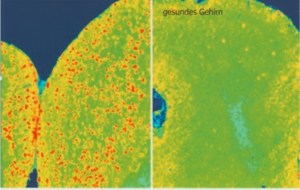
The expression of monoamine oxidase B (MAO B) is already increased in early adulthood (shown as red dots in the figure on the left) because the level of biosynthesis of (S/S)-S-Adenosylmethionine (SAM-e, Ademetionine), the methyl group donor for DNA and histone (hereditary material), is reduced.
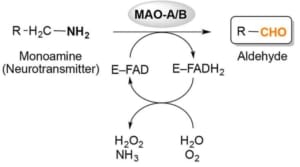
One effect of increased expression of MAO B is oxidative desamination of the principal brain neurotransmitters dopamine, serotonin, noradrenaline, and adrenaline resulting in neuronal cell death in the brain caused by ROS (reactive oxygen species), a metabolic product that is highly aggressive towards neurones.
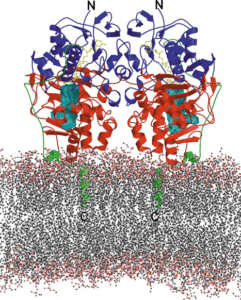
Figure: MAO-B belongs to the Flavin Monoamine Oxidases and adheres to the outer mitochondrial membrane. With increasing age and in patients with Alzheimer’s dementia, there is an increase in MAO B expression up to 5-fold, due to the age-dependent deficiency of (S/S)-S-Adenosylmethionine (SAM-e, Ademetionine). The role of (S/S)-S-Adenosylmethionine (SAM-e, Ademetionine) is to silence the MAO B expression at the gene locus and prevent the increase in MAO B expression and thus the rise in MAO B. The breakdown of important brain neurotransmitters such as dopamine, serotonin, norepinephrine, and adrenaline leads to a permanent neurotransmitter deficiency, deteriorating cognition, emotions, and actions. This neurotransmitter breakdown is accompanied by the production of reactive oxygen species (ROS) and is destructive to mitochondria and brain cells. This leads to neurodegeneration and mitochondrial loss. Thus, at the clinical initial diagnosis of Alzheimer’s dementia, a significant portion of functional brain cells is irreparably destroyed. If this destruction caused by increased MAO B can be halted by (S/S)-S-Adenosylmethionine (SAM-e, ADEMETIONINE) supplementation, there is a possibility that cognitive brain function may improve through neurogenesis, generating “index” neurons in the hippocampus.
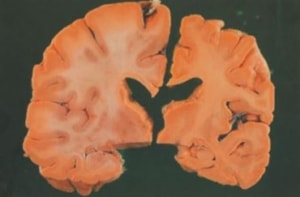
Figure: On the left: a healthy brain. On the right: brain atrophy caused by MAO B-related neurodegeneration
One important mechanism involved is the inhibition of the gene location of MAO B via methylation.
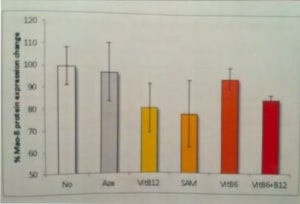
Copyright 2014 Dr. Eduard Rappold
Figure: MAO B expression shutdown by SAM = S-Adenosylmethionine = Ademetionine
This process is dependent on the availability (S/S)-S-Adenosylmethionine (SAM-e, Ademetionine) , the methyl group donor for hereditary material. Improved brain performance after supplementation with (S/S)-S-Adenosylmethionine (SAM-e, Ademetionine) is described unanimously for those suffering from Alzheimer’s dementia or mild cognitive impairment.
Which factors impede cellular vitality, good health, and longevity of an organism?
Cellular health is dependent on the number and state of health of mitochondria.
Mitochondrial health is dependent on two factors: firstly, an intact respiratory chain is needed to supply the organism with sufficient energy-rich ATP and, secondly, the production of ROS (reactive oxygen species) which are biologically highly aggressive molecules, that target and destroy cellular and mitochondrial macromolecules, mitochondrial and nuclear DNA, RNA, phospholipids and proteins.
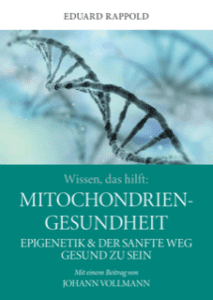
Compounding the problem is, that CHRONIC STRESS, which is linked to a hyperactive HPA axis, increases monoamine oxidase (MAO) expression even more via increased glucocorticoid availability thereby intensifying mitochondrial dysfunction (epigenetically acquired mitochondriopathy).
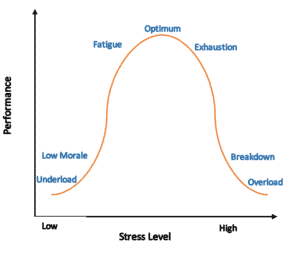
Mitochondrial dysfunction is observed in many neurodegenerative diseases such as Huntington’s Disease (HD), Parkinson’s Disease (PD), Amyotrophic Lateral Sclerosis (ALS), stroke and epilepsy. In addition, research conducted in the last couple of years has suggested that mitochondrial dysfunction is also seen in psychiatric diseases such as bipolar disorder (BD) or depression and metabolic diseases like diabetes mellitus.
A deficiency of soy spermidine, contained in SPERMIDINE SOYUP SOYPOWDER, also results in a methylation deficit in hereditary substances because soy spermidine, just like (S/S)-S-Adenosylmethionine (SAM-e, Ademetionine), is an epigenetically active key molecule in metabolism and together with (S/S)-S-Adenosylmethionine (SAM-e, Ademetionine) protects cellular health.
Metabolic diversity of ADEMETIONINE and SPERMIDINE
(S/S)-S-Adenosylmethionine (SAM-e, Ademetionine) is the sole methyl group donor (CH3 group donor) for DNA (hereditary material) and is also involved in hundreds more methylation processes, for example the biosynthesis of melatonin for healthy sleep, of glutathione, the most effective intracellular antioxidant, of choline for the production of acetylcholine which is important for our memory, for biotin and alpha lipoic acid, and for creatinine and L-carnitine.
SPERMIDINE is also involved in the methylation of genes and is a potent inducer of autophagy, a process with can be likened to a cellular cleansing mechanism and is used by cells to get rid of toxic waste products. Autophagy results in relief, better functionality a prolonged lifetime. Superfluous, excessive, or damaged macromolecules (misfolded proteins, DNA, RNA), organelles, and intracellular bacteria, viruses, or other microorganisms are digested by hydrolytic enzymes in bag-shaped structures called lysozymes.
Spermidine biosynthesis is also already reduced in young adults by a third. (S/S)-S-Adenosylmethionine (SAM-e, Ademetionine) is also essential for SPERMIDINE biosynthesis.
That means (S/S)-S-Adenosylmethionine (SAM-e, Ademetionine) as well as SPERMIDINE must be supplemented in adults to protect cellular health.
Use our EPIAGE TEST to determine the methylation grade of your hereditary material and determine your true biological age with an amazing reliability of 0,96.
Note: This information is provided for educational purposes and does not substitute for professional medical advice. Always consult with healthcare providers for personalized guidance on health-related matters.
Copyright © Eduard Rappold 2024
NUGENIS PRODUCTS – ORDER
Conveniently order from our online shop







